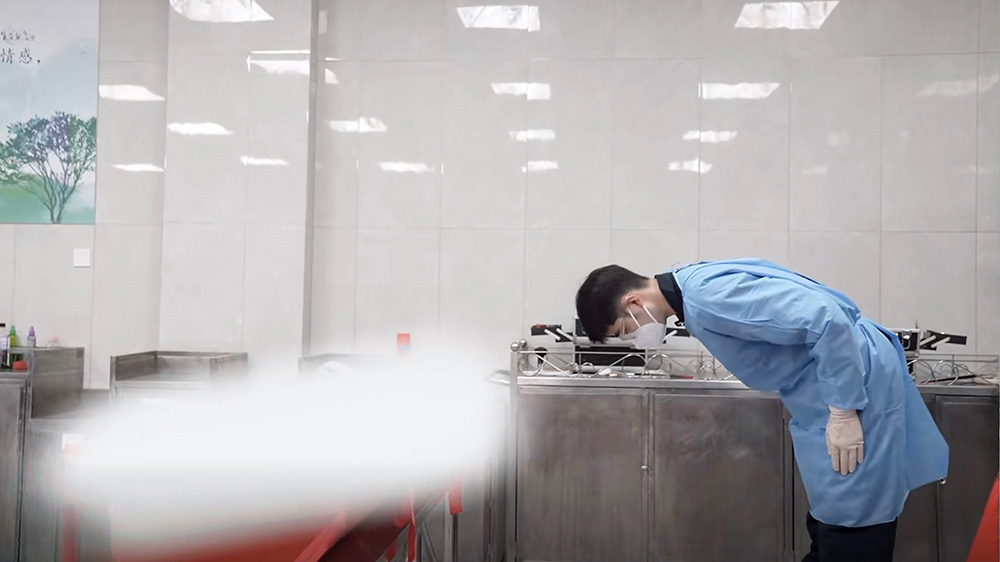More young Chinese are studying deathcare despite silence and stigma. What compels them to embrace a job so few dare to name?
In a funeral home in the centre of Changsha, Jiang Xin leaned close to the mannequin and practised the last step of facial restoration. The practice room smells of disinfectant. Outside, a crematorium stack lets out a thin plume against a grey sky.
Originally, she could have chosen popular majors like teaching, medicine, or engineering, as many classmates did. But the silence around death drew her in. When others skipped past “funeral service” on the college application portal, Jiang Xin stopped and looked.
“I don’t think this major is terrible,” she said. “When I see this major, I know that this is what I want to choose to do. I like to do challenging things. Even if I know that this major is full of many prejudices and doubts, I don’t think it’s necessary to avoid it, just like each of us needs to face the necessary death issue in life.”
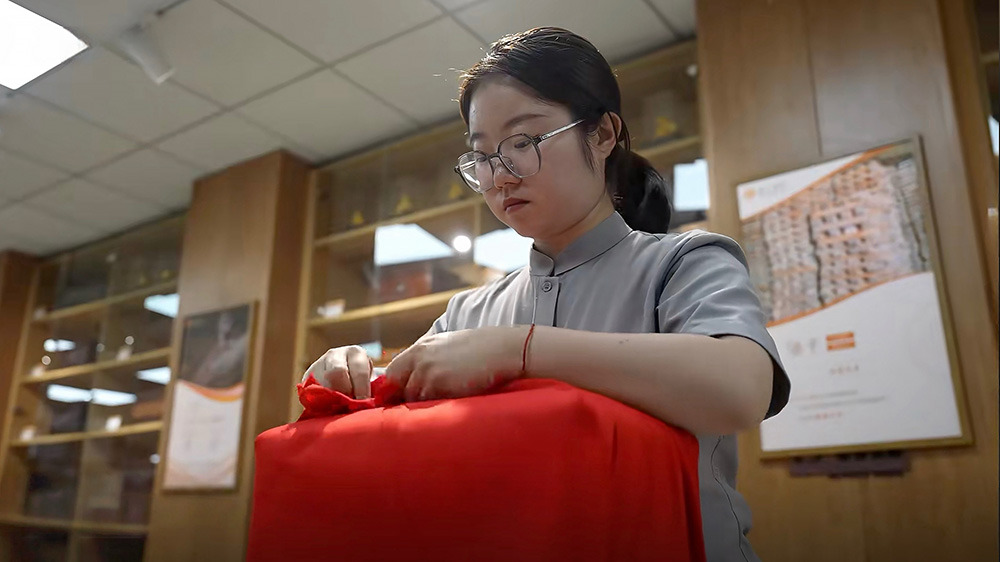
Their choices sit inside a larger, more structural story: interest in deathcare is rising, yet family resistance, stigma, and thin career ladders keep the path narrow. Training programmes remain small and uneven, and hiring can be opaque. What follows traces how students hold their nerve while they learn the craft. Her parents couldn’t accept her choice at all. Her father even suggested that she retake the college entrance examination to achieve a higher score and change to another major. Some relatives assumed she picked the major only because her grades were too low. She tried to explain the meaning of the profession and the appeal to her, but the more she explained, the more her family resisted.
At the beginning, she also doubted herself. During holidays, her high school friends posted beach trips on social media, while she practised sutures on artificial skin in the training room. “Sometimes I don’t feel like I’m living a real college life at all,” she said, “but I also thought that if I can’t even stand this kind of loneliness, maybe I’m not suitable for this job at all.”
She recalled that when she entered the prep room for her first internship, everything was not as unbearable as she thought. The smell, silence, and the decedent in front of her landed silent and heavy in her chest. “I thought I would run away in fear,” she said, “but I just stood there with an unusually calm mind. The calmness of that moment told me that I was ready to become a real embalmer.”
For Jiang Xin, this job changed her perception of time. “Nothing here can be rushed,” she said. “Every move should be slowed down. Because I realise that the sense of immersion and gain brought to me in the process of work is much more important than the final results.”
Shu Yongqi, 21 years old, is also studying at Changsha Vocational and Technical College. He is a classmate of Jiang Xin. He still clearly remembers the moment when he first saw the profession of “funeral service” in the college application system. The name is so strange that it is completely different from the direction he has been taught to choose since he was a child. “I didn’t even want to talk about death before,” he said, “but at that moment, I felt that it was very real and very close to me.”
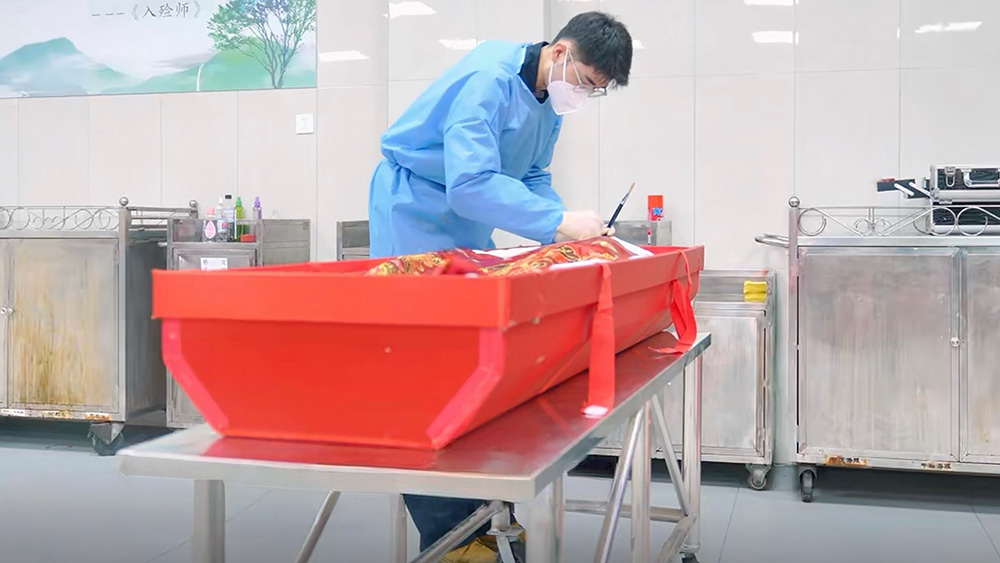
He began to watch relevant professional videos online. Some of them are promotional films produced by the school’s funeral programme, and some are clips of the embalmers sharing their daily work. Gradually, the initial curiosity turned into a kind of respect and recognition. “Everyone praises the greatness of doctors for saving people,” Shu said, “but I think it is equally important to help a person leave the world with dignity.”
“This was not originally in my major selection plan,” he said, “but the more I know about this major, the more interested I am in it and the more I want to study it in depth. This society always needs people to undertake the work that no one wants to do but must be done by someone. I want to be that person.”
On campus, the work begins far from the prep room. First-years learn infection control and documentation before they ever step into a mortuary. In practice labs they suture on silicone pads, mix colour to soften bruising, and rehearse three ways to explain consent to families. Tutors drill a simple sequence: intake, identification, restoration, verification, and handover. A laminated checklist by the sink tracks small habits, from labelling instruments to a final surface clean. The routine can sound dull; students say it steadies the room.
By the first placement, routines learned in class met the realities of the room. When Shu Yongqi faced the real decedent in his first internship, it was not only fear that hit him, but also sobriety. He said, “The first time I observed death at close range, I felt that my heart was heavy and unspeakable. That equipment and those pictures are no longer theories in the textbook but the things I really have to face every day from now on. At that moment, I clearly knew what I was going to do now and to become a real embalmer, and I also strengthened my original intention of choosing this major.”
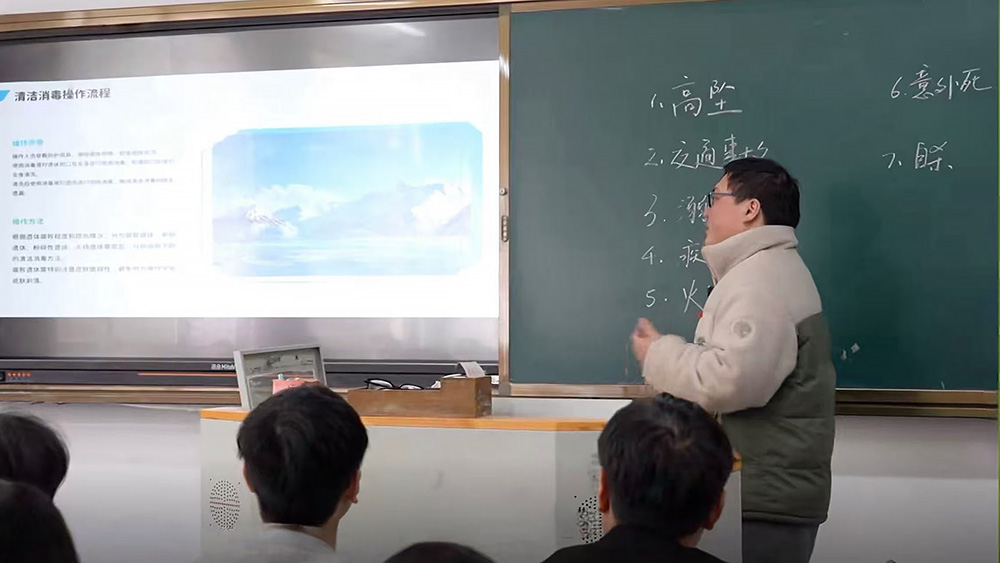
To Shu Yongqi’s surprise, he found himself entirely focussed during that first placement. “When you really start facial restoration, you don’t have time to think about it at all,” he said. “What you are thinking about is symmetry, bruises, and bone structure. The professional knowledge that you have learned in books suddenly comes into your mind. At that time, the only idea in my mind was how to do it better.”
During an internship, Shu Yongqi was responsible for handling the remains of a mother and daughter who died in a car accident, whose faces had collapsed so badly that they could hardly be recognised. “That was the first time I completed the difficult facial restoration without the guidance of a supervising instructor,” he said. “Every step requires me to make my own on-site judgement and temporary adjustment. I have carefully completed every step, firstly, to prove my ability, and secondly, to hope that the family can slow down the sadness when saying goodbye to their family member.”
Even now, Shu Yongqi rarely takes the initiative to tell others about his major. “I usually say ‘medical-related things,'” he said. “This is more trouble-free and less entangled with those who don’t respect you. As long as I know what I’m doing, that’s enough.”
And there are many voices of young people like them who choose this major to be questioned by others. Jiang Xin remembered that once a decedent was taken into the coffin, and the security guard in the morgue asked her jokingly, “How did you do this job? You are so young.” She didn’t reply. She just kept bowing her head to sign the logbook and left in a hurry. “I began to think, did I choose the wrong direction? Is this job really not worthy of being understood by others?” She said.
These moments have become a part of their daily life. When their peers are busy planning more decent career directions, such as finance or education, all funeral students can do is work through loneliness and misunderstanding in day-to-day practice. “Sometimes people don’t ask you this on purpose,” Jiang Xin said. “It’s just that they never thought that any job needs professional people to do. So now I hope that time can help us slowly break these prejudices and stigmas.”
Shu Yongqi agrees with her. He began to pay more attention to those who really understood the value of his work. “Every time I see the dedication and respect of the intern teacher who took me to deal with the remains, I think that maybe one day, I will become such a person,” he said. “I hope I can become a respectable person.”
Over time, both learned to live with the stigma. Jiang Xin writes notes after each placement and sometimes sketches details of restorations she has completed. Shu Yongqi occasionally posts videos on his social media account. They are all slowly breaking the prejudices and perceptions of society in their own way, whether in front of the stage or behind the scenes. They teach in small, steady steps rather than performance.
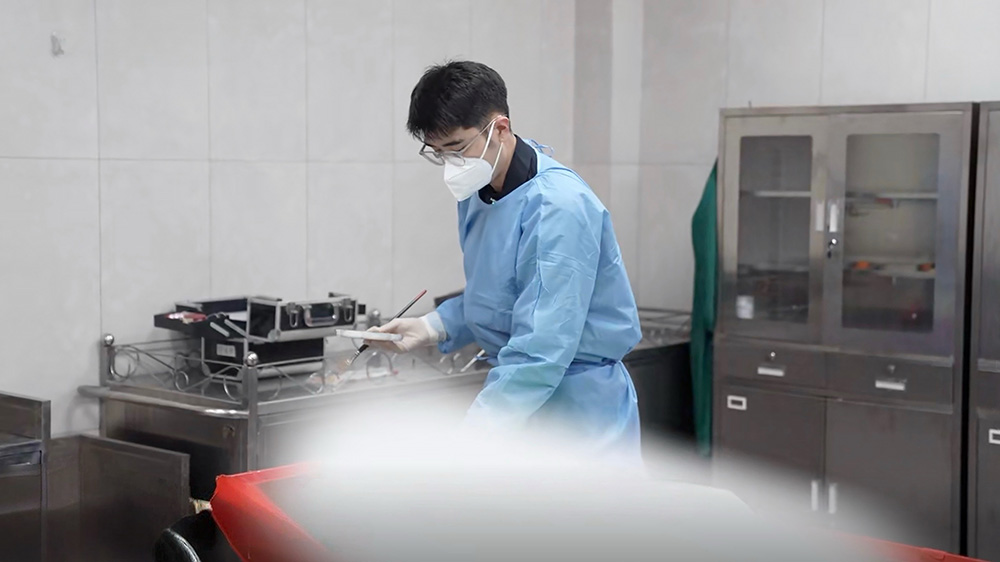
Between placements, the cohort leans on quiet networks. Students swap notes about safe lifting, share part-time leads, and pool money for practice heads. A teacher runs evening debriefs for interns who have handled difficult cases; most sessions are practical, not therapeutic. People ask where to tuck a suture, how to speak to a cousin who is angry, and what to do when a watch turns up in a transfer bag. The answers stay dry and procedural. For many, that matter-of-fact tone is a kind of care.
They have all talked about fatigue. Their fatigue is more emotional than physical. “You begin to re-examine many things,” Jiang Xin said. “Your sense of life and death, and of yourself, shifts. For me, I am more optimistic and cherish the life I have now more than before.”
Industry forecasts put China’s deathcare market at about RMB 411.4bn by 2026. Yet training pipelines remain small and uneven, and entry-level hiring is often opaque. For Jiang Xin, the most difficult part now is not to touch the remains but to try to find a job after the internship. “There are really not many opportunities for newcomers like me,” she said. “This profession is not like what people say online; actually, you don’t get a job as soon as you graduate. We are struggling to find a job as hard as other college graduates. Some funeral homes don’t recruit college students who have just graduated, and some only need employees with more than five years of experience, but I don’t want to and won’t give up being in my chosen career.”
She has also considered continuing to study, but there is no clear career path in this industry. “Postgraduate routes are thin.” She said, “There is no clear road map. I can only keep submitting resumes and hope someone is willing to give me a chance.”
Shu Yongqi also faces similar work barriers, but in different forms. He knows that many funeral homes are more inclined to hire by internal referrals when recruiting. “Some positions have been pre-allocated internally before the public release,” he said. “Everyone says that there is a shortage of people in the industry, but when it comes to recruitment, they will not give us these new opportunities at all.” A 2024 listing in Guangzhou advertised a cremator post filled by a master’s graduate and prompted public debate over credentials, entry routes, and career ladders, according to local media and the civil affairs bureau.
What employers ask for is plain but hard to meet: a clean driving record, comfort with night-shift rotation, evidence of two-person lifts, and experience fielding calls from families. Few of these are taught as standalone modules, so students collect them piecemeal during placements. Several say they would welcome a clear ladder that links credentials to pay bands and titles, instead of today’s patchwork of local rules.
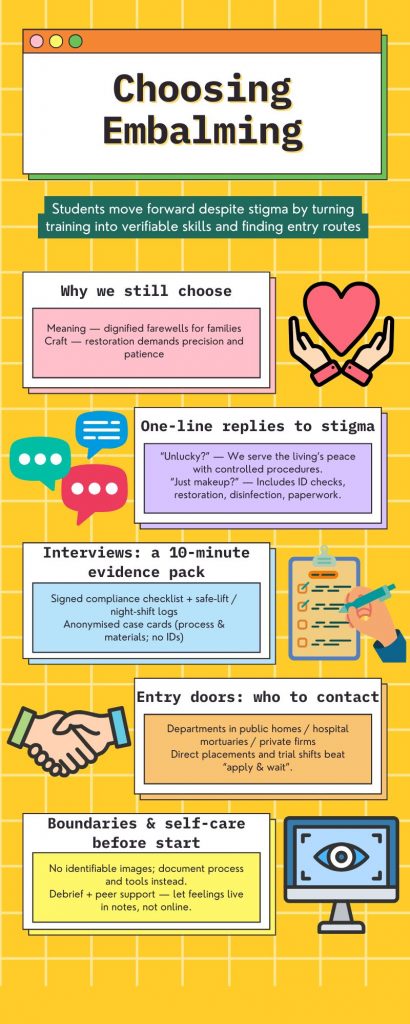
He has considered opening a funeral-supplies shop but still wants to work as an embalmer. “I want to be a real embalmer,” he said, “so I started to update my technical videos on Douyin, hoping to let more people see what we are doing. But we really need more real-world employment opportunities, not just likes and follows.”
Nevertheless, Jiang Xin and Shu Yongqi both said that they were not ready to leave the industry. “Many students in our major changed direction after internships,” Jiang Xin said. “Some of them are because they are afraid of facing the real world, and most of them are because it is difficult to find a job. They have changed to another major in the postgraduate entrance examination.”
“Perhaps a few videos we shot can’t really change social prejudice and professional stigma,” she said, “but I choose to stay. Because the deceased deserves to be respected, and so does this profession.”
